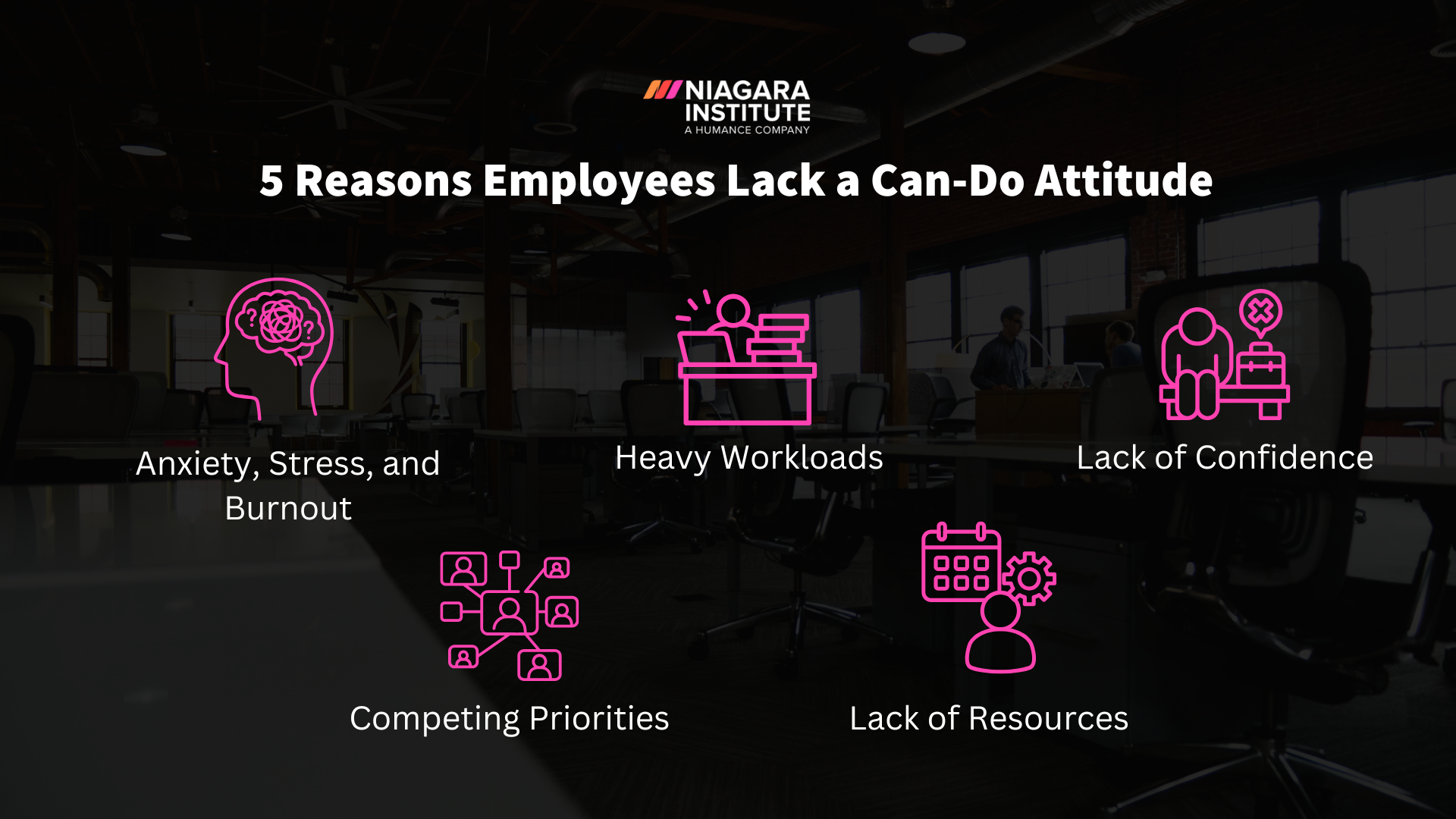8 min read
10 Things Your Direct Reports Really Want From You
With a team of unique individuals with different personalities, experiences, and preferences, it is hard to know what your direct reports want and...
3 min read
 Michelle Bennett
:
Jan 6, 2022 5:00:00 AM
Michelle Bennett
:
Jan 6, 2022 5:00:00 AM

There are some people who unintentionally and naturally exude a can-do attitude. They don’t shrink away from a challenge but rather face it head-on. They rarely complain and instead are focused on finding solutions. They’re confident in their ability to get something done and are willing to do the work, even if it's hard, to make it happen.
In the simplest terms, someone who has a can-do attitude is positive, motivated, and engaged with the task at hand.
So, why do some direct reports seem to struggle to adopt a can-do attitude?
If you think it’s because your direct reports are lazy or don’t care, think again. More often than not, the real reason employees struggle to adopt a can-do attitude is far more complicated.
To help you discover why exactly you’re struggling to get your employees to adopt a can-do attitude, here are five very real things that might be standing in the way that you consequently need to remove or help them navigate.

Right now, our average, everyday work stress has been amplified by the effects of things like the “great resignation,” climate change, and major social events, such as Black Lives Matter. Not to mention, nearly 70% of professionals who transitioned to remote work because of the pandemic say they now work on the weekends, and 45% say they regularly work more hours during the week than they did before.
In other words, your direct reports are dealing with a lot right now that causes anxiety, stress, and burnout, which in turn inevitably impacts their willingness to adopt a can-do attitude and ability to stay motivated.
According to one study, 39% of workers say that a heavy workload was their leading cause of stress. This is concerning given that stress at work has been proven to result in lower productivity, increased absenteeism, and even turnover, as 19% of respondents said they have quit a job before because of stress.
If your direct report is struggling under the weight of an unmanageable and heavy workload, then you’re going to need to deal with that before you can expect to see changes regarding the individuals' attitude.
To alleviate heavy workloads, schedule regular one-on-one meetings so you can stay connected and coach them to prioritize, redistribute and eliminate tasks. In addition, implementing a workload management tool and providing opportunities to develop their skills can help with unmanageable workloads. These activities should be the pathway to freeing your direct reports capacity, so the next time you ask them to take on a new task, they can go at it with a can-do attitude.
When a direct report isn’t overly eager to take on a task, it may be due to a lack of confidence and a fear of failure. An individual is not going to have a can-do attitude if internally they’re telling themselves, “I can’t do this,” or “this will be a disaster.”
If you think this may be the reason, it is up to you to create the right conditions that they’re not afraid to let you know when they’re struggling. Taking the time to build a relationship and growing their trust will ensure they feel comfortable speaking up when they feel out of their depths with an assignment.
If your direct reports don’t know how to discern an urgent vs. an important task, manage expectations, and set boundaries, they will constantly feel pulled in multiple directions. As a result, they’ll likely say something to you along the lines of, “everything feels urgent and important!” In the end, they’ll end up exhausted and frustrated, at which point it’s hard to muster up a can-do attitude.
In this case, you’re going to need to help them develop these skills either by enrolling them in a time management training program or coaching them yourself. Once they have the skills to navigate competing priorities, they’ll be in a far better headspace to adopt that can-do attitude you desire them to have.
Organizations will always want their employees to do more with less. But, in reality, this may mean your direct reports are working with outdated, broken, or overcomplicated technology and processes. It may mean someone is doing the job of a colleague who quit six months ago, on top of their own, because a replacement wasn’t approved.
People might be willing to adopt a can-do attitude for a short period of time, but when it’s a persistent issue, it becomes difficult for individuals to maintain such an attitude. The bottom line is that your employees need resources such as budget, personnel, technology, tools, and training, to do their best work, and if they don’t have those, it’s up to you as their leader to advocate for such resources. When you do so, your direct reports will respect, appreciate, and trust you, which ultimately positively influences their level of motivation and engagement.
Employee motivation is complicated. It’s not as simple as wishing or telling a direct report to have a can-do attitude. It requires you to be willing to understand what motivates an employee and what impedes their ability to do their best work, and then for you actually to do something about it. Only then will you begin to see your employees adopt a can-do attitude that positively influences their productivity and success.

8 min read
With a team of unique individuals with different personalities, experiences, and preferences, it is hard to know what your direct reports want and...

6 min read
Being an effective leader requires going beyond meeting deadlines and achieving goals. The best leaders understand they play a critical role in...
.png)
7 min read
People management is all about one thing - people. It’s about ensuring the people in your charge have everything they need to do their job and do it...